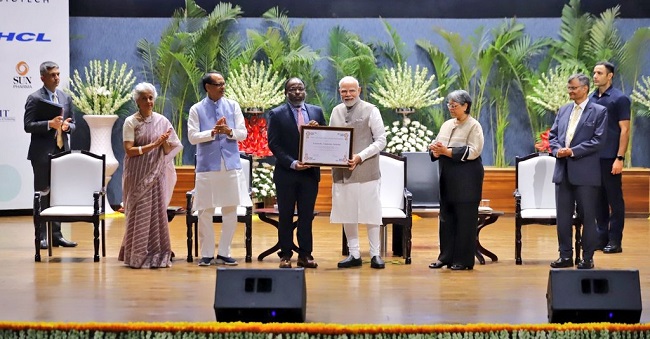Nigeria made history when Professor Ademola Adenle, one of the country’s foremost intellectuals and sustainability experts, was announced as the first-ever winner of The World Academy of Sciences (TWAS) and M.S. Swaminathan Award for Food and Peace.
Often referred to as a “mini Nobel Peace Prize,” the award was presented by Indian Prime Minister Narendra Modi during the M.S. Swaminathan Centenary International Conference in New Delhi.

The prestigious new global honour was established by TWAS in memory of the late Professor M.S. Swaminathan, the world-renowned agricultural scientist celebrated as the “Father of India’s Green Revolution”. His groundbreaking work transformed India’s food systems and inspired agricultural innovations around the world.
Professor Adenle, who serves as Senior Special Adviser on Agricultural Innovation in Nigeria’s Federal Ministry of Agriculture, was honoured for his outstanding contributions to food security, climate justice, and the empowerment of vulnerable communities.
His work spans agricultural innovation policy, biosciences, renewable energy, and public health, with a focus on providing solutions to rural and marginalised populations in Africa and beyond. It also promotes for policies that prioritise climate-resilient agriculture, equitable technology access, rural infrastructure development, and farmer-supportive financing methods, particularly for women and youth.
In response to his announcement as the pioneer winner, he said, receiving this award is an incredible honour.
“As the son of a smallholder farmer, I witnessed firsthand the struggles of low agricultural productivity and rural poverty. This recognition reaffirms my lifelong commitment to advancing science and innovation that can transform agriculture, improve livelihoods, and build a more sustainable future,” he stated.
Prof. Adenle’s upcoming projects will include launching a Women in Biosciences Initiative to enhance rural agricultural productivity through training, entrepreneurship, and innovation. The initiative will also address public health challenges such as malnutrition and waterborne diseases, while advancing renewable energy solutions – particularly solar power – to tackle energy poverty. This work will be carried out in collaboration with the M.S. Swaminathan Research Foundation in both Africa and Asia, continuing Professor Swaminathan’s broader mission of combining science with social equity.
“The Global South faces enormous challenges in meeting the Sustainable Development Goals,” Prof. Adenle hinted. “But with investment in science and innovation, strong partnerships, and inclusive policies, we can accelerate progress. I dedicate this award to smallholder farmers and rural communities whose resilience has never stopped inspiring me.”
Prof. Adenle’s recognition underscores the increasing role of African scientists in shaping global sustainability agendas. This milestone not only cements Prof. Adenle’s position as a global leader in sustainability science but also serves as a call to action for governments, development agencies, and researchers to work together in building a more food-secure, just, and sustainable world.
In his address, Prime Minister Modi praised the laureates as “beacons of hope” for their dedication to addressing some of humanity’s most pressing challenges.
The M.S. Swaminathan Award for Food and Peace recognises individuals from developing countries who have made transformative contributions to food security, sustainable agriculture, and peacebuilding.
By Etta Michael Bisong, Abuja
